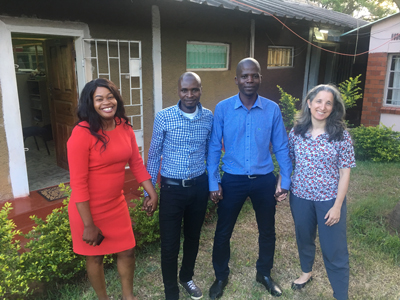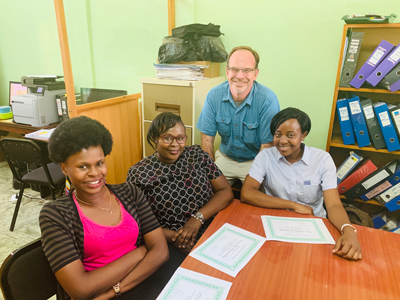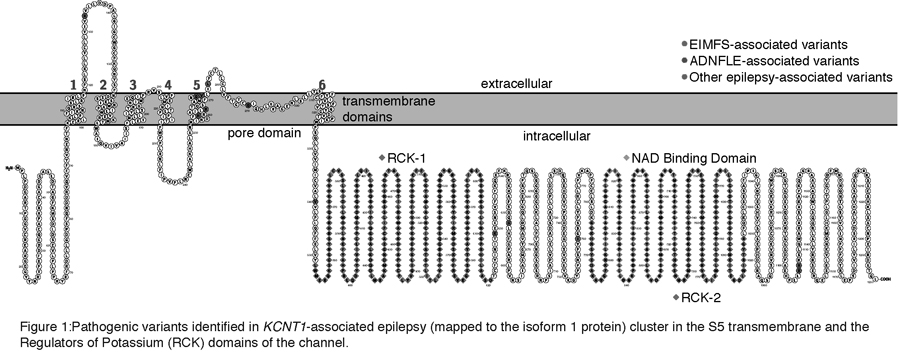Research Projects
HIV-Associated Neurocognitive Disorders in Zambia (HANDZ)

HANDZ team members from left to right: Dr. Sylvia Mwanza Kabaghe (Co-investigator), Pelekelo Kabundela (PhD Student), Esau Mbewe (PhD Student), and Dr. Heather Adams (Co-investigator).
The HANDZ study is a prospective longitudinal study of cognitive and neuropsychiatric complications and comorbidities of pediatric HIV. The overarching goals of the study are to validate cognitive and psychiatric testing tools in children with HIV in Zambia, and to determine whether inflammatory biomarkers and brain imaging can prospectively identify children at high risk of developing cognitive impairment. The specific research aims are:
- To identify culturally appropriate tools for the assessment of cognitive impairment and psychiatric comorbidities in children and adolescents with HIV in Zambia
- To determine the prevalence and annual incidence of cognitive impairment, depression, and anxiety disorders among children and adolescents with HIV in Zambia
- To identify serum biomarkers associated with cognitive impairment in children and adolescents with HIV in Zambia
- To identify imaging findings associated with cognitive impairment in children and adolescents with HIV in Zambia
- To develop a predictive model of cognitive change over time in children and adolescents with HIV.
Ultimately, our long-term objectives are to build capacity for future studies of HIV associated neurocognitive disorders in Zambian children, and in doing so, to set the stage for future clinical trials to treat or prevent the neuropsychiatric complications of HIV infection in Zambian youth.
The International Center for Genomic Medicine in Neuromuscular Disease (ICGNMD)

ICGNMD team members from left to right: Milimo Mweemba (Study coordinator), Priscilla Mweemba (Study Clinical Officer), Dr. Alex Paciorkowski (Consultant), and Musambo Kapapa (Neuromuscular fellow).
Dr. Bearden is the Principal Investigator for the Zambian site of the ICGNMD. The goal of this study is to create a transcontinental genomics research and capacity building partnership between the UK and five low and middle income countries (Brazil, India, South Africa, Turkey and Zambia.) As part of this study, we aim to discover new disease genes, understand comparative genetic architecture and explore disease mechanisms for genetic neuromuscular disorders. We will increase the number of patients with an accurate genetic diagnosis, build trial-ready cohorts, and ultimately improve health outcomes for patients with neuromuscular diseases.
The KCNT1 Natural History Study
Pathogenic variants in the KCNT1 gene cause a variety of epilepsy types that are often resistant to treatment with conventional anti-seizure drugs, with the most common being Epilepsy of Infancy with Migrating Focal Seizures (EIMFS). Dr. Bearden has led an international registry to study the natural history and optimal treatments for this disorder, and is the principal investigator of the KCNT1 Natural History E-Study. The goal of these studies is to set the stage for targeted therapy trials, which are planned to start in 2024. For more information on these studies contact KCNT1_study@URMC.Rochester.edu.

ZC4H2-associated Rare Disorder Natural History Study (ZARD-NHS)
Pathogenic variants in ZC4H2 cause a variety of neurodevelopmental disorders often characterized by muscle contractures at birth (arthrogryposis), seizures, and global developmental delays. These developmental disorders are collectively referred to as ZC4H2-associated Rare Disorder (ZARD). Dr. Bearden is the Principal Investigator for the ZARD Natural History Study, which attempts to characterize disease phenotypes and progression over time, with the goal of developing optimal treatments for patients with this condition. For more information about this study contact zard_study@urmc.rochester.edu